| Listing 1 - 10 of 11 | << page >> |
Sort by
|
Multi
ISBN: 9781107635975 9781139381307 9781107031173 9781107031180 9781107670648 9781107028654 9781107655478 9781107028678 9781107610415 1107028671 1107635977 1107670640 1107031184 1107028655 1107655471 1107031176 1107610419 113938130X 113955137X 1139552635 1139555081 1139556339 1139557580 1283637537 1316090345 1139381318 1139551388 1139552643 113955509X 1139556347 1139557599 1283637545 1316090353 1107237076 1107254817 1107301696 1107304997 1107306787 1107308984 1107312337 1107314534 1139236784 1299006310 9781139236782 Year: 2013 Publisher: New York Cambridge University Press
Abstract | Keywords | Export | Availability | Bookmark
 Loading...
Loading...Choose an application
- Reference Manager
- EndNote
- RefWorks (Direct export to RefWorks)
Distinguishing four sources of power in human societies - ideological, economic, military and political - The Sources of Social Power traces their interrelations throughout human history. This second volume deals with power relations between the Industrial Revolution and the First World War, focusing on France, Great Britain, Hapsburg Austria, Prussia/Germany and the United States. Based on considerable empirical research, it provides original theories of the rise of nations and nationalism, of class conflict, of the modern state and of modern militarism. While not afraid to generalize, it also stresses social and historical complexity. Michael Mann sees human society as 'a patterned mess' and attempts to provide a sociological theory appropriate to this, his final chapter giving an original explanation of the causes of the First World War. First published in 1993, this new edition of Volume 2 includes a new preface by the author examining the impact and legacy of the work.
Social history --- Power (Social sciences) --- Political philosophy. Social philosophy --- anno 1900-1999 --- Macht (sociale wetenschappen). --- Sociale geschiedenis. --- Social Sciences --- Sociology --- Social history. --- World history
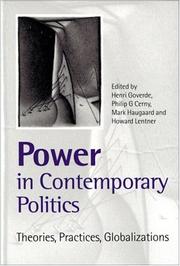
ISBN: 0761966773 0761966765 9780761966777 1446219933 1446234509 1282623311 9786612623318 085702647X 9780857026477 9781446219935 9781446234501 9781282623316 6612623314 9780761966760 9780761966760 Year: 2000 Publisher: London: Sage,
Abstract | Keywords | Export | Availability | Bookmark
 Loading...
Loading...Choose an application
- Reference Manager
- EndNote
- RefWorks (Direct export to RefWorks)
Amongst the themes explored in this text are the reproduction and legitimisation of power, the dynamics of resistance and coercion, concepts of private and public power, the impact of globalisation and subsequent shifting power arrangements.
Political philosophy. Social philosophy --- Political systems --- Macht (Sociale wetenschappen) --- Political power --- Pouvoir (Sciences sociales) --- Power (Social sciences) --- Pouvoir (sciences sociales) --- Autorité --- #SBIB:013.AANKOOP --- #SBIB:324H20 --- Politologie: theorieën (democratie, comparatieve studieën….) --- Authority. --- Power (Philosophy). --- Power (Social sciences). --- Political Theory of the State --- Political Science --- Law, Politics & Government --- Empowerment (Social sciences) --- Exchange theory (Sociology) --- Political science --- Social sciences --- Sociology --- Consensus (Social sciences) --- Autorité. --- Authoritarianism
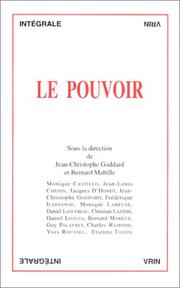
ISBN: 2711612058 9782711612055 Year: 1994 Volume: [3] Publisher: Paris: Vrin,
Abstract | Keywords | Export | Availability | Bookmark
 Loading...
Loading...Choose an application
- Reference Manager
- EndNote
- RefWorks (Direct export to RefWorks)
Macht (Sociale wetenschappen) --- Political power --- Pouvoir (Sciences sociales) --- Power (Social sciences) --- Control (Psychology) --- Power (Christian theology) --- Power (Philosophy) --- Puissance (métaphysique) --- Pouvoir (philosophie) --- Empowerment (Social sciences) --- Exchange theory (Sociology) --- Political science --- Social sciences --- Sociology --- Consensus (Social sciences) --- Authority --- Ethics --- Philosophy --- Power (Theology) --- Christian sociology --- Power (Psychology) --- Emotions --- Psychology --- Senses and sensation --- CDL --- 14 --- Puissance (métaphysique)
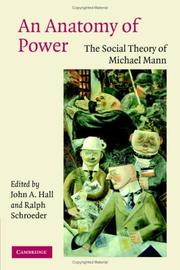
ISBN: 0521850002 0521615186 9780521615181 9780521850001 9780511488993 0511146892 9780511146893 0511146310 9780511146312 0511488998 1280431547 9781280431548 9786610431540 661043154X 1107153506 9781107153509 0511183992 9780511183997 0511312474 9780511312472 051114587X Year: 2005 Publisher: Cambridge Cambridge University Press
Abstract | Keywords | Export | Availability | Bookmark
 Loading...
Loading...Choose an application
- Reference Manager
- EndNote
- RefWorks (Direct export to RefWorks)
Michael Mann is one of the most influential sociologists of recent decades. His work has had a major impact in sociology, history, political science, international relations and other social science disciplines. His main work, The Sources of Social Power, of which two of three volumes have been completed, provides an all-encompassing account of the history of power from the beginnings of stratified societies to present day. Recently he has published two major works, Fascists and The Dark Side of Democracy. Yet unlike other contemporary social thinkers, Mann's work has not, until now, been systematically and critically assessed. This volume assembles a group of distinguished scholars to take stock, both of Mann's overall method and of his account of particular periods and historical cases. It also contains Mann's reply where he answers his critics and forcefully restates his position. This is a unique and provocative study for scholars and students alike.
Macht (Sociale wetenschappen) --- Political power --- Pouvoir (Sciences sociales) --- Power (Social sciences) --- Mann, Michael, --- Social sciences --- Sociology --- Social philosophy --- Social theory --- Empowerment (Social sciences) --- Exchange theory (Sociology) --- Political science --- Consensus (Social sciences) --- Philosophy --- Criticism and interpretation. --- Power (Social sciences). --- Philosophy. --- Sociologie --- Sciences sociales --- Philosophie --- Mann, Michael --- Criticism and interpretation --- Sociology. --- Social Sciences
Multi
ISBN: 9781107028654 9781139236751 9781107655478 9781139550093 1139550098 9781139555050 1139555057 1139564870 1316090256 1283610884 113923675X 1139551345 9786613923332 1139552600 1139556304 1139557556 1107028655 1107655471 9781139564878 9781316090251 9781283610889 9781139551342 6613923338 9781139552608 9781139556309 1107031176 1107670640 1107031184 9781107610415 9781107635975 1107610419 1107028671 9781107031180 9781107031173 9781107670648 1107635977 9781107028678 Year: 2012 Publisher: Cambridge, Mass.: Cambridge university press,
Abstract | Keywords | Export | Availability | Bookmark
 Loading...
Loading...Choose an application
- Reference Manager
- EndNote
- RefWorks (Direct export to RefWorks)
Distinguishing four sources of power - ideological, economic, military and political - this series traces their interrelations throughout human history. This third volume of Michael Mann's analytical history of social power begins with nineteenth-century global empires and continues with a global history of the twentieth century up to 1945. Mann focuses on the interrelated development of capitalism, nation-states and empires. Volume 3 discusses the 'Great Divergence' between the fortunes of the West and the rest of the world; the self-destruction of European and Japanese power in two world wars; the Great Depression; the rise of American and Soviet power; the rivalry between capitalism, socialism and fascism; and the triumph of a reformed and democratic capitalism.
World history --- anno 1900-1999 --- anno 1800-1899 --- Sociale geschiedenis. --- Macht (sociale wetenschappen). --- Power (Social sciences) --- Social history. --- Descriptive sociology --- Social conditions --- Social history --- History --- Sociology --- Empowerment (Social sciences) --- Political power --- Exchange theory (Sociology) --- Political science --- Social sciences --- Consensus (Social sciences) --- Social Sciences
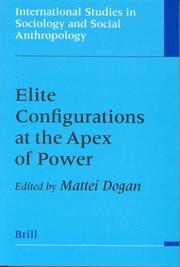
ISBN: 9004128085 9786610467006 1423712226 1280467002 9047401743 9789004128088 9781423712220 9789047401742 9781280467004 6610467005 Year: 2003 Volume: 85 Publisher: Leiden: Brill,
Abstract | Keywords | Export | Availability | Bookmark
 Loading...
Loading...Choose an application
- Reference Manager
- EndNote
- RefWorks (Direct export to RefWorks)
This text focuses on the interpenetration between various types of elites: politicians, owners of capital, corporate managers, higher state administrators, directors of public enterprises, controllers of media, military officers and the civic-cultural establishment. ;
Political leadership. --- Elite (Social sciences) --- Power (Social sciences) --- Elite (Sciences sociales) --- Elite (Sociale wetenschappen) --- Leadership politique --- Macht (Sociale wetenschappen) --- Political leadership --- Political power --- Politiek leiderschap --- Pouvoir (Sciences sociales) --- #SBIB:324H41 --- 316.46 --- 316.344.42 --- 316.344.42 Elite --- Elite --- 316.46 Gezag. Leiderschap. Macht --- Gezag. Leiderschap. Macht --- Politieke structuren: elite --- Empowerment (Social sciences) --- Exchange theory (Sociology) --- Political science --- Social sciences --- Sociology --- Consensus (Social sciences) --- Leadership --- Elites (Social sciences) --- Social classes --- Social groups
Book
ISBN: 1441104178 1282452533 9786612452536 0826438172 9780826438171 0826487440 9780826487445 0826487432 9780826487438 9781282452534 9780826487445 9780826487438 9781441104175 6612452536 Year: 2008 Publisher: London Continuum
Abstract | Keywords | Export | Availability | Bookmark
 Loading...
Loading...Choose an application
- Reference Manager
- EndNote
- RefWorks (Direct export to RefWorks)
How language is used in institutions and how institutions generate language is a key concern of both sociolinguistics and social theory. This readable and comprehensive introduction to language and power in institutions combines theoretical reflection with a strong analytical focus. Covering a range of institutional discourses and settings, each chapter in Language and Power closely examines institutional discourse practices and provides detailed steps to the critical analysis of institutional discourse both linguistic and multimodal. This book is a long overdue contribution to the analysis of
Sociolinguistics. --- Power (Social sciences) --- Language policy. --- Glottopolitics --- Institutional linguistics --- Language and languages --- Language and state --- Languages, National --- Languages, Official --- National languages --- Official languages --- State and language --- Communication policy --- Language planning --- Empowerment (Social sciences) --- Political power --- Exchange theory (Sociology) --- Political science --- Social sciences --- Sociology --- Consensus (Social sciences) --- Language and society --- Society and language --- Sociology of language --- Language and culture --- Linguistics --- Integrational linguistics (Oxford school) --- Government policy --- Social aspects --- Sociological aspects --- Language policy --- Sociolinguistics --- #SBIB:309H250 --- #SBIB:309H511 --- #KVHA:Discourse studies --- #KVHA:Institutionele taal --- Interne en externe communicatie: algemene werken --- Verbale communicatie: algemene pragmatiek, stilistiek en teksttheorie, discoursanalyse --- Pragmatics --- Power (Social sciences). --- Discourse analysis --- Maatschappelijke instellingen --- Macht (sociale wetenschappen). --- Sociolinguïstiek. --- Taalpolitiek. --- Discoursanalyse --- Sociale aspecten. --- Discours.
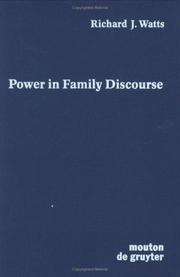
ISBN: 3110132281 3111781801 3110854783 9783110854787 9783110132281 Year: 1991 Volume: 63 Publisher: Berlin New York Mouton de Gruyter
Abstract | Keywords | Export | Availability | Bookmark
 Loading...
Loading...Choose an application
- Reference Manager
- EndNote
- RefWorks (Direct export to RefWorks)
Sociology of the family. Sociology of sexuality --- Sociolinguistics --- Communicatie in het gezin --- Communication dans la famille --- Communication in families --- Communication in the family --- Communication interpersonnelle --- Intermenselijke communicatie --- Interpersonal communication --- Langage -- Aspects sociaux --- Langage -- Sociologie --- Langage et société --- Language and languages -- Social aspects --- Language and languages -- Sociological aspects --- Language and society --- Langues -- Aspects sociaux --- Langues -- Sociologie --- Macht (Sociale wetenschappen) --- Political power --- Pouvoir (Sciences sociales) --- Power (Social sciences) --- Society and language --- Sociolinguistique --- Sociolinguïstiek --- Sociologie des langues --- Sociologie du langage --- Sociology of language --- Société et langage --- Communication in families. --- Interpersonal communication. --- Sociolinguistics. --- Empowerment (Social sciences) --- Language and languages --- Family communication --- Social aspects --- Sociological aspects --- Exchange theory (Sociology) --- Political science --- Social sciences --- Sociology --- Consensus (Social sciences) --- Language and culture --- Linguistics --- Integrational linguistics (Oxford school) --- Communication --- Interpersonal relations --- Families --- Communication in the family.
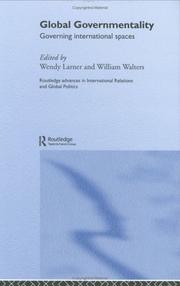
ISBN: 0415311381 0203458486 9780203458488 9781134386086 1134386087 9786610077533 6610077533 9781134386093 1134386095 9781134386048 1134386044 0203344391 9780203344392 9780415311380 9780415406802 0415406803 0203354168 1280077530 9780203354162 9781280077531 Year: 2004 Volume: 28 Publisher: New York (N.Y.) : London : Routledge, ; Taylor & Francis,
Abstract | Keywords | Export | Availability | Bookmark
 Loading...
Loading...Choose an application
- Reference Manager
- EndNote
- RefWorks (Direct export to RefWorks)
Foucault's thoughts on governmentality have made a significant impact on the studies of power and governance in modern societies. However, most studies of governmentality confine themselves to the exploration of power within nation-states. Global Governmentality extends Foucault's political thought towards international studies, exploring the governance of the global, the international, the regional and many other extra-domestic spaces.Combining historical and contemporary outlooks, this book offers innovative interdisciplinary explorations of such issues as international peacekee
Administration internationale --- Authority --- Autorité --- Communauté internationale --- Communauté mondiale --- Federation [International ] --- Fédération mondiale --- Gezag --- Globalisering --- Globalization --- Gouvernement mondial --- Interdependence of nations --- International administration --- International federation --- International organization --- Internationale Organisation --- Internationale organisatie --- Internationalisatie --- Internationalisation --- Internationalisering --- Internationalization --- Macht (Sociale wetenschappen) --- Mondialisation --- Mundialisering --- Nouvel ordre international --- Ordre international --- Ordre mondial --- Organisatie [Internationale ] --- Organisation internationale --- Organisation mondiale --- Organismo internacional --- Organization [International ] --- Organização internacional --- Political power --- Pouvoir (Sciences sociales) --- Power (Social sciences) --- Société internationale --- Wereldfederatie --- Wereldorde --- Wereldregering --- World federation --- World government --- World order --- World organization --- International organization. --- Globalization. --- Authority. --- Geografie --- Sociale geografie --- Politieke Geografie. --- Power (Social sciences). --- Autorité --- Political science --- Authoritarianism --- Consensus (Social sciences) --- Empowerment (Social sciences) --- Exchange theory (Sociology) --- Social sciences --- Sociology --- Global cities --- Globalisation --- International relations --- Anti-globalization movement --- Federation, International --- Global governance --- Organization, International --- Congresses and conventions --- Peace --- International agencies --- International cooperation --- Security, International --- World politics
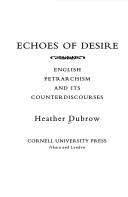
ISBN: 0801429668 9781501722844 1501722840 9780801429668 1501722859 Year: 2018 Publisher: Cornell University Press
Abstract | Keywords | Export | Availability | Bookmark
 Loading...
Loading...Choose an application
- Reference Manager
- EndNote
- RefWorks (Direct export to RefWorks)
Echoes of Desire variously invokes and interrogates a number of historicist and feminist premises about Tudor and Stuart literature by examining the connections between the anti-Petrarchan tradition and mainstream Petrarchan poetry. It also addresses some of the broader implications of contemporary critical methodologies. Heather Dubrow offers an alternative to the two predominant models used in previous treatments of Petrarchism: the all-powerful poet and silenced mistress on the one hand and the poet as subservient patron on the other.
Begeerte in de literatuur --- Desire in literature --- Désir dans la littérature --- Hommes et femmes [Relations entre ] dans la littérature --- Macht (Sociale wetenschappen) in de literatuur --- Man-vrouw relaties in de literatuur --- Man-woman relationships in literature --- Petrarchism --- Petrarkisme --- Petrarquisme --- Pouvoir (Sciences sociales) dans la littérature --- Power (Social sciences) in literature --- Relations entre hommes et femmes dans la littérature --- Rôle selon le sexe dans la littérature --- Seksuele rolpatronen in de literatuur --- Sex role in literature --- English poetry --- Early modern, 1500-1700 --- History and criticism --- Love poetry [English ] --- English literature --- Italian influences --- Sonnets [English ] --- Sonnets, English - History and criticism. --- Man-woman relationships in literature. --- Love poetry, English --- History and criticism. --- Petrarca, Francesco, --- Influence. --- Pétrarque --- Petrarch --- Petracco, Francesco --- Petrarca, Franciscus, --- Petrarch, --- Petrarch, Francesco, --- Petrarcha, Franciscus, --- Petrark, --- Petrarka, Franchesko, --- Peṭrarḳa, Frants'esḳo, --- Pétrarque, --- Петрарка, Франческо, --- פטררקא, פרנצ׳סקו --- Petrarca, Francesco --- Literary studies: c 1400 to c 1600
| Listing 1 - 10 of 11 | << page >> |
Sort by
|

 Search
Search Feedback
Feedback About UniCat
About UniCat  Help
Help News
News